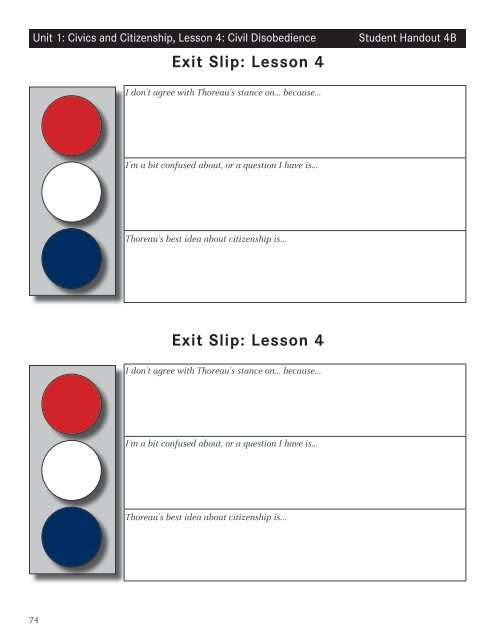the Unit 1: Civics and Citizenship Lessons (pdf) - The Ronald ...
the Unit 1: Civics and Citizenship Lessons (pdf) - The Ronald ...
the Unit 1: Civics and Citizenship Lessons (pdf) - The Ronald ...
Create successful ePaper yourself
Turn your PDF publications into a flip-book with our unique Google optimized e-Paper software.
<strong>Unit</strong> 1: <strong>Civics</strong> <strong>and</strong> <strong>Citizenship</strong>, Lesson 4: Civil DisobedienceExit Slip: Lesson 4I don’t agree with Thoreau’s stance on… because…I’m a bit confused about, or a question I have is…Thoreau’s best idea about citizenship is…Exit Slip: Lesson 4I don’t agree with Thoreau’s stance on… because…I’m a bit confused about, or a question I have is…Thoreau’s best idea about citizenship is…74Student H<strong>and</strong>out 4BLesson 5: Private vs. Public CharacterOverviewThis lesson will explore <strong>the</strong> traits displayed by public figures inboth <strong>the</strong>ir private <strong>and</strong> public lives. Students will examine sourcesthat discuss both <strong>the</strong> public <strong>and</strong> private lives of John F. Kennedy,Condoleezza Rice, <strong>and</strong> Henry Clay.ObjectivesStudents will be able to (SWBAT):• identify specific traits of private <strong>and</strong> public character displayedby select public figures.• evaluate <strong>the</strong> connection between traits displayed in private life<strong>and</strong> traits displayed in public life.• make <strong>and</strong> defend a judgment on which traits are most essentialfor improving American society.Classroom ProceduresI. Essential Question(s) – What civic dispositions or traits ofprivate <strong>and</strong> public character are important to <strong>the</strong> preservation<strong>and</strong> improvement of American constitutional democracy?II. Agenda - (Teachers may project or write this agenda)• Essential Question• Hook: Four Corners Activity• Primary Source Exploration• Exit SlipIII. Hook (15 minutes)• As students enter <strong>the</strong> class, project <strong>the</strong> following quotation: “Asknot what your country can do for you, but what you can do foryour country.” - John F. Kennedy• <strong>The</strong> four corners of classroom are labeled as follows: StronglyAgree, Agree, Disagree, Strongly Disagree. (Signs are includedin previous lesson)• Read <strong>the</strong> quotation aloud to <strong>the</strong> students. Students <strong>the</strong>n move to<strong>the</strong> corner of <strong>the</strong> classroom that best represents <strong>the</strong>ir reactionto <strong>the</strong> statement. While in <strong>the</strong>ir corner, students should discuss<strong>the</strong>ir reasoning with o<strong>the</strong>r members of <strong>the</strong> group, <strong>and</strong> form anargument explaining why. (5 minutes)• Students who change <strong>the</strong>ir mind during <strong>the</strong> course of <strong>the</strong>discussion may change groups.• Each group chooses a spokesperson to present <strong>the</strong>ir viewpoint,<strong>and</strong> has one minute to explain its reasoning. Allow ano<strong>the</strong>rminute allowed for questions <strong>and</strong> response from o<strong>the</strong>r groups.End with a couple of minutes for wrap-up discussion.IV. Primary Source Exploration (60-90 minutes)• Prior to this activity, you will want to arrange students in groupsof six.• In this activity students will participate in a jigsaw activity as<strong>the</strong>y explore several primary <strong>and</strong> secondary sources related topublic figures. Documents include Senator John F. Kennedy’sstatement on <strong>the</strong> “Senate Reception Room,” as well as twoexcerpts on events from his private life, Condoleezza Rice’s“Opening Statement” for her Secretary of State confirmationhearings, <strong>and</strong> Abraham Lincoln’s “Eulogy for Henry Clay.”STANDARDSCCE/NSCGV.D.1 explain <strong>the</strong> meaning <strong>and</strong> importance ofself-discipline <strong>and</strong> self-governance.V.D.2 explain <strong>the</strong> meaning <strong>and</strong> importance ofrespect for <strong>the</strong> rights <strong>and</strong> choices of individuals.V.D.3 explain <strong>the</strong> meaning of civic mindedness.V.D.4 evaluate <strong>the</strong> usefulness of certain traitsin facilitating thoughtful <strong>and</strong> effective participationin public affairs.NCSSII. Time, Continuity, & Changed. systematically employ <strong>the</strong> process ofcritical historical inquiry to reconstruct <strong>and</strong>reinterpret <strong>the</strong> past, such as using a varietyof sources <strong>and</strong> checking <strong>the</strong>ir credibility...IV. Individual Development & Identityb. identify, describe, <strong>and</strong> express appreciationfor <strong>the</strong> influences of various historical<strong>and</strong> contemporary cultures on an individual’sdaily life.IRA/ NCTE• 7.Students conduct research on issues <strong>and</strong> interestsby generating ideas <strong>and</strong> questions, <strong>and</strong>by posing problems. <strong>The</strong>y ga<strong>the</strong>r, evaluate, <strong>and</strong>syn<strong>the</strong>size data from a variety of sources (e.g.,print <strong>and</strong> non-print texts, artifacts, people) tocommunicate <strong>the</strong>ir discoveries in ways thatsuit <strong>the</strong>ir purpose <strong>and</strong> audience.Key TermsSelf-Discipline- <strong>the</strong> power to disciplineone’s own feelings, desires, actions, etc...especially with <strong>the</strong> intention of improvingoneself or doing <strong>the</strong> right thing.Public Affairs- issues arising from <strong>the</strong>relationship of <strong>the</strong> public to <strong>the</strong> governmentor ano<strong>the</strong>r institution.Jingoism- extreme nationalism or patriotism,often in <strong>the</strong> form of aggressive foreignpolicy.Chauvinism- fanatical patriotism, orprejudiced belief in <strong>the</strong> superiority of one’sown group.Patriotism- a feeling of love <strong>and</strong> devotiontowards one’s country.Civility- courteous behavior, being polite.75


